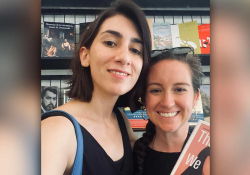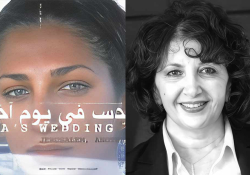The Very Short Q&A on Very Short Fiction
 Carmen Boullosa
Carmen Boullosa
tr. Kristina Zdravič Reardon
Q: Is there a quote you like or think is particularly fitting or relevant to very short fiction, whether by a fiction writer or by someone in a field other than literature, be it the arts, sciences, philosophy, religion, or other area?
A: “In the beginning was the Word.”
Q: Do you have a favorite flash story or writer, or favorite book of very short fictions?
A: I have a favorite writer: Silvina Ocampo, co-editor with J. L. Borges and Adolfo Bioy Casares of the classic Antología de la literatura fantástica (1971). She is in no hurry. But she always manages to be so unexpected and disturbing.
Q: What are you reading now?
A: I am rereading the prose of Amado Nervo, an author who was very popular before World War I. I’m especially interested in his fiction, and specifically the pieces that incorporate the fantastic. He was very influential for Cortázar, Bioy Casares, and, without a doubt, Borges.
Q: What does flash fiction offer readers that slow fiction doesn’t?
A: I don’t really know that I’m a fan of “flash.” I am not a good judge. . . . I am in favor of “slow food” and “slow fiction.”
Q: Did any of your longer work begin as a short-short story, or vice versa?
A: I don’t think so. I am more like a Ninja turtle than a Flash Gordon. But in one novel—El velázquez de París (The Velázquez of Paris)—the narrative does begin with a short story, but then, after this flash beginning, it becomes a novel. I treasure the time a novel, or a poem, needs.
Carmen Boullosa (b. Mexico City, 1954) is the author of fifteen novels and numerous poems, plays, and short stories. She is a co-founder of Mexico City’s Citlaltépetl Refuge House (page 80). She currently serves as a contributing editor of Books Without Borders and has been visiting professor at San Diego State University, Georgetown, and La Sorbonne. She lives in New York City.
At any given moment, words in three different languages were heard around the dinner table in writer Kristina Zdravič Reardon’s childhood. She finds that translating literature from her grandparents’ native Slovene and Spanish to English is a challenging—yet somehow natural—pursuit. Reardon holds an MFA from the University of New Hampshire and has been awarded a Fulbright translation grant and one from the Tinker Foundation for Latin American Studies.
 Hisham Bustani
Hisham Bustani
Q: Is there a quote you like or think is particularly fitting or relevant to very short fiction, whether by a fiction writer or by someone in a field other than literature, be it the arts, sciences, philosophy, religion, or other area?
A: I think quantum physics and flash fiction are closely related. Werner Heisenberg, the scientist credited with conceptualizing the uncertainty principle, says, “The atoms or elementary particles themselves are not real; they form a world of potentialities or possibilities rather than one of things or facts.” That relates strongly to flash fiction, which aims to engage and to form this “world of potentialities and possibilities.” The great philosopher of science Karl Popper says, “We do not know: we can only guess.” That is also what great flash fiction is about, creating spaces rather than confiscating them.
Q: Do you have a favorite flash story or writer, or favorite book of very short fictions?
A: The legendary Augusto Monterroso ranks among those who continue to inspire me. On another level, I think many of Charles Bukowski’s poems are excellent pieces of very short or flash fiction. He is also one of my main influences.
Q: What are you reading now?
A: A Whistler in the Nightworld: Short Fiction From the Latin Americas, edited by Thomas Colchie (Plume, 2002).
Q: What does flash fiction offer readers that slow fiction doesn’t?
A: A greater opportunity to engage, contemplate, astonish, shock, and complete what the writer began. Good flash fiction is like fast-acting LSD.
Hisham Bustani (b. 1975, Amman, Jordan) writes fiction and has three published collections of short fiction: Of Love and Death (2008), The Monotonous Chaos of Existence (2010), and The Perception of Meaning (2012). The German review Inamo has chosen him as one of the Arab world’s emerging and influential new writers, translating one of his stories into German for its special issue on “New Arab Literature” (December 2009, www.inamo.de). Acclaimed for his contemporary themes, style, and language, he experiments with the boundaries of narration and poetry. He was recently featured in the March/April 2012 issue of Poets & Writers.
 Alex Epstein
Alex Epstein
Q: Is there a quote you like or think is particularly fitting or relevant to very short fiction, whether by a fiction writer or by someone in a field other than literature, be it the arts, sciences, philosophy, religion, or other area?
A: The very short prayer by D. W. Winnicott: “Oh God, may I be alive when I die.”
Q: Do you have a favorite flash story or writer, or favorite book of very short fictions?
A: Invisible Cities, by Italo Calvino.
Q: What are you reading now?
A: The Butterfly Crosses the Road, a collection of poems by Eeva Kilpi, a wonderful Finnish poet.
Q: What does flash fiction offer readers that slow fiction doesn’t?
A: Longing.
Q: Did any of your longer work begin as a short-short story, or vice versa?
A: When I start to write a very short story, I always imagine it as a novel. In some parallel universe, there must be a crazy writer who is actually writing those novels.
Alex Epstein moved from Leningrad to Israel when he was eight years old, almost a decade before the fall of the Berlin Wall. He has since published three novels and four collections of short stories. His collections of short-short fiction, Blue Has No South and Lunar Savings Time, are available in English. He teaches creative writing in Tel Aviv.
Becka Mara McKay is Assistant Professor of translation and creative writing at Florida Atlantic University. Her first book of poems, A Meteorologist in the Promised Land, was published in 2010. She has published three translations of fiction from the Hebrew, including Epstein's Blue Has No South and Lunar Savings Time. In 2006 she was nominated for a Pushcart Prize.
 Vanessa Gebbie
Vanessa Gebbie
Q: Is there a quote you like or think is particularly fitting or relevant to very short fiction, whether by a fiction writer or by someone in a field other than literature, be it the arts, sciences, philosophy, religion, or other area?
A: I love this one in particular—it makes me smile: “It is my ambition to say in ten sentences what others say in a whole book.” – Friedrich Nietzsche
Q: Do you have a favorite flash story or writer, or favorite book of very short fictions?
A: I am very taken with the short works of Italo Calvino, Ana María Shua, and of my colleagues Tania Hershman and David Gaffney. Some short-short pieces in The Tent, by Margaret Atwood, are incredibly powerful, too. But there are so many—it always feels invidious to list just a few. Look at “Little Things,” by Raymond Carver (www.carversite.com/story.html). Isn’t it just perfect?
Q: What are you reading now?
A: I have just finished and loved Half-Blood Blues, by Esi Edugyan.
Q: What does flash fiction offer readers that slow fiction doesn’t?
A: Hmm, that’s actually a hard question to answer, as my reply only applies to the best. However, I do believe that a good reader’s engagement with a well-crafted flash fiction can act like a lens, in the same way that a magnifying glass can concentrate a small ray of sunlight and render it far more powerful than it might seem at first. Perhaps it is a function of what is not in the flash, as opposed to what is? The reader engages to the extent that she fills in the spaces, and the reading experience becomes much more of a joint effort in which the reader and writer are in effect working closely together to create something larger than the word count. There is an intensity that cannot be sustained by either writer or reader for a much longer piece, I think.
Q: Did any of your longer work begin as a short-short story, or vice versa?
A: Yes, absolutely. I wrote a very short piece back in 2004, based on a sad but true story of a boy who was killed playing in a railway tunnel while he was skipping school. Later, I extended it into a longer story, and it won a small competition. In 2006–07 I revisited it again, changed the voice and the setting, and the original “flash” became part of the backstory of a yet more extended short story that won a Bridport Prize in 2007. Finally, that validation gave me the impetus to continue and turn the piece into part of a novel. Three years later, Bloomsbury bought the book, and my debut novel, The Coward’s Tale, came out in the UK in November 2011 and in the United States early in 2012. The original “flash” is still there, more or less, in a different voice, right at the heart of the book, and knowing that gives me great pleasure.
It just goes to show what a short-short story can do if it gets under the skin of its maker!
Vanessa Gebbie is a Welsh writer of stories from ten to one hundred thousand words in length. She is author of two collections of short and flash fictions: Words from a Glass Bubble and Storm Warning—Echoes of Conflict. Her debut novel, The Coward’s Tale, was a Financial Times 2011 Book of the Year and also a Guardian readers’ Book of the Year. She is contributing editor to Short Circuit: A Guide to the Art of the Short Story and a freelance creative writing teacher. She lives in the south of the UK with her family.
 Josefine Klougart
Josefine Klougart
tr. Alexander Weinstein
Q: Is there a quote you like or think is particularly fitting or relevant to very short fiction, whether by a fiction writer or by someone in a field other than literature, be it the arts, sciences, philosophy, religion, or other area?
A: “The past isn’t dead. It’s not even past.” I always have this quote by William Faulkner in mind when it comes to saying something relevant about literature or the human mind in general. It really is a good description of how the mind works, or at least how mine does. The human mind, and the poetic mind, in particular, doesn’t care about categories such as time and space; it moves with great agility in patterns that transcend these categories. This experience, of the mind transcending these categories, must always be embedded in writing. Otherwise literature becomes nostalgic, loses its connection to nature and everything that “really is.” As a short-story writer, you don’t want that to happen, and you don’t want it to happen as a human being. Everything is present always, right now: the past, what you sense, your reflections and imagination, and the sense of what is coming. That is what literature is all about, this entanglement. The short story, at its best, is able to condense this experience of entanglement, to collapse time and place and crystalize it through a scene, a thought, a language; language transcends what we think is possible; it gives us a possibility to see the world as it is, as it was, and as it will be. A lightning strike of beauty in the awareness of these elements as one embrace, that is what Faulkner is saying.
Q: Do you have a favorite flash story or writer, or favorite book of very short fictions?
A: I just returned to Denmark after a three-month writing exile in New York. Here I bought Anne Carson’s If Not, Winter, a translation of Sappho’s songs. These fragments are a perfect example on what short prose is able to do: to condense. My favorite poem or my favorite fragment is this; it is only one line: “as long as you want.” In this kind of sentence everything is embedded. I cried in the subway, I have read the book four times, and I am still crying when I read it now. It is a radiant sentence, it contains what was and what will come, and everything that never was, and what you thought you had forever. All in these five words. Marvelous. What more do you need?
Q: What are you reading now?
A: I am reading On Photography, by Susan Sontag. For inexplicable reasons I’ve never read her, but have always known that this was something I had to read at some point. I am breath-taken by her crystal-clear reflections on art and life. It’s inspiring and challenging to read her. In my books I am interested in images in general: the image as photography, the image as a painting, the picture as a reflective system, as perception—I am very interested in how these different incarnations of the image interact.
Q: Did any of your longer work begin as a short-short story, or vice versa?
A: I very seldom think in genres or form—actually, all I write is the same, lyrical prose, you can read it as short stories, maybe even poems, or novels. My second novel, Hallerne, is a little different. Its structure is simpler and is more coherent than my other two novels. With Hallerne I had the sense that it could either be a short novel or an encyclopedic novel. But before I came to this realization I had already written the structure of the novel. From within. Then I kept on adding scenes and images. Like bread in the oven, the novel grew from within; like a bundle of short stories you could say. I think of my novels as independently functioning bodies, and as such you can examine every part individually; you could look at a hand, a knee, an upper lip, all independently, but of course mutually dependent on each other and totally interconnected by a circulation of blood.
Josefine Klougart is the best-selling author of the collection Rises and Falls and the novels The Halls and One of Us Is Sleeping. She is regarded by critics as one of Denmark’s preeminent new postmodernists, and her first collection has been nominated for the 2011 Nordic Council Literary Prize.
Alexander Weinstein is Director of the Martha’s Vineyard Institute of Creative Writing and a professor at Siena Heights University. His fiction has appeared or is forthcoming in Pleiades, Sou’Wester, and Cream City Review. He is presently finishing his first collection, The Apocalypse Tales.
 Nora Nadjarian
Nora Nadjarian
Q: Is there a quote you like or think is particularly fitting or relevant to very short fiction, whether by a fiction writer or by someone in a field other than literature, be it the arts, sciences, philosophy, religion, or other area?
A: “A word is a lot.” —Etgar Keret. That one extra, often decorative and unnecessary word can be so annoying. I cut out words ruthlessly.
Q: Do you have a favorite flash story or writer, or favorite book of very short fictions?
A: I love Etgar Keret’s tiny, zany, odd, often heartbreaking stories. My favorite story of his has got to be “Hole in the Wall.” The last line gives me the chills, every time: “That he wasn’t even an angel, just a liar with wings.” I also adore the spare, poetic world of Simon Van Booy in Love Begins in Winter and The Secret Lives of People in Love. I see his longer work as a series of chillingly beautiful flash.
Q: What are you reading now?
A: The Elegance of the Hedgehog, by Muriel Barbery.
Q: What does flash fiction offer readers that slow fiction doesn’t?
A: It’s hard to define flash fiction. I like to think of it as the “heart” of fiction, the essential that is required for the story to be alive, to breathe. I have always loved stories that imply rather than expressly state something, leaving things out rather than cramming the page with words. Minimalism can punch you in the face and make you sit up and take notice.
Q: Did any of your longer work begin as a short-short story, or vice versa?
A: I have sometimes “padded” my short-shorts into longer stories, but have always felt that they have lost rather than gained in the process.
Nora Nadjarian is a poet and short-story writer from Cyprus. In addition to three poetry collections, a book of short stories, Ledra Street (2006), and a chapbook of fairy-tale-inspired microfiction, Girl, Wolf, Bones (2011), she has had work published online and in journals worldwide. She has also won prizes and commendations in international competitions, including the Commonwealth Short Story Competition and the Seán Ó Faoláin Short Story Prize. Her work was recently included in the anthologies Best European Fiction 2011 and Being Human (2011).
 Sylvia Petter
Sylvia Petter
Q: Is there a quote you like or think is particularly fitting or relevant to very short fiction, whether by a fiction writer or by someone in a field other than literature, be it the arts, sciences, philosophy, religion, or other area?
A: I particularly like Vic Errington's answer: a form of healing (http://www.flash-fiction-world.com/what-is-flash-fiction.html).
Q: Do you have a favorite flash story or writer, or favorite book of very short fictions?
A: I love Tania Hershman’s work and also the work of Marcus Speh, who writes weird and wonderful flashes that can be found on his blog at http://marcusspeh.com/or in literary magazines.
Q: What are you reading now?
A: I am currently reading a novella called Thinner Than a Hair by Adnan Mahmutović, whom I met at the short-story conference in Little Rock. This is not flash fiction, but there are many olfactory images, which, like flash fiction, can bring forth personal associations.
Q: What does flash fiction offer readers that slow fiction doesn’t?
A: Because flash fiction trades on images and associations, the reader can become directly involved very quickly. Like smells, those associations arrive often without announcement, somehow even bypassing language to leave the reader with sometimes very personal insights.
Q: Did any of your longer work begin as a short-short story, or vice-versa?
A: My story “Old Japan” started as a 950-word story. I then added another story before and one after to make the twenty-page “An Imaginary Friend,” a story published in Thema in 1997. But I usually find that my flashes are happy to be as they are.
Sylvia Petter is an Australian living in Austria. Author of the story collection The Past Present (UK, 2001) and Back Burning (Australia, 2007), her stories have been widely published online and in print, and lately in various charity anthologies. Sylvia has a PhD in creative writing from the University of New South Wales and is currently revising a novel. She participates in local writing-related events, leads flash-fiction workshops, and works part-time in the area of education research at the University of Vienna.
 Lili Potpara
Lili Potpara
Q: Is there a quote you like or think is particularly fitting or relevant to very short fiction, whether by a fiction writer or by someone in a field other than literature, be it the arts, sciences, philosophy, religion, or other area?
A: “Less is more,” originally from a poem by Robert Browning, and later associated with the minimalist architect Mies van der Rohe.
Q: Do you have a favorite flash story or writer, or favorite book of very short fictions?
A: No, not really, though I quite like Andrej Blatnik’s book of very short stories You Do Understand.
Q: What are you reading now?
A: Anne Michaels’s Fugitive Pieces.
Q: What does flash fiction offer readers that slow fiction doesn’t?
A: Ideally, a very intense mental picture or emotional experience similar to that produced by haiku in poetry.
Q: Did any of your longer work begin as a short-short story, or vice versa?
A: Sometimes a sentence or sequences of sentences “come out of nowhere,” and I write them down in my little notebook. At other times, inspiration comes in the form of a series of scenes or a dialogue, very concise, but when I start writing, a longer piece usually emerges.
Lili Potpara is a Slovenian writer and translator. She studied English and French at the University of Ljubljana. She has translated numerous works into both Slovenian and English, and her short fiction has been published in a variety of Slovenian magazines. She has published two collections of short stories. Her first, Zgodbe na dušek (Bottoms up stories), won the Prize for Best Literary Debut from the Professional Association of Publishers and Booksellers of Slovenia in 2002.
Kristina Zdravič Reardon holds an MFA from the University of New Hampshire and has been awarded a Fulbright translation grant and one from the Tinker Foundation for Latin American Studies.
 Clemens Setz
Clemens Setz
tr. Peter Constantine
Q: Is there a quote you like or think is particularly fitting or relevant to very short fiction, whether by a fiction writer or by someone in a field other than literature, be it the arts, sciences, philosophy, religion, or other area?
A: “Just speak your self, that’s riddle enough,” the Sphinx says in the second part of Goethe’s Faust.
Q: Do you have a favorite flash story or writer, or favorite book of very short fictions?
A: Félix Fénéon, a French writer and journalist. He wrote what he called “Stories in three lines” for Figaro—small, dense spotlights on the inexhaustible strangeness of human interactions. One example: “Madame Couderc, of Saint-Ouen, was constantly kept from hanging herself from her window latch. At her wit’s end, she fled across the fields.”
Q: What are you reading now?
A: Kristin Lavransdatter, by Sigrid Undset—quite the opposite of flash fiction.
Q: What does flash fiction offer readers that slow fiction doesn’t?
A: The delightfully paradoxical feeling of reading that’s reflected in Hamlet’s words: “O God, I could be bounded in a nutshell, and count myself a king of infinite space.”
Q: Did any of your longer work begin as a short-short story, or vice versa?
A: Yes, it happens quite often. A story only gradually divulges the form it needs to lead a life of its own.
Clemens Setz (b. 1982, Graz) is one of the foremost young writers in the German-speaking world. He was a runner-up for the prestigious German Book Award and has received numerous prizes.
Peter Constantine translates literature from many languages, including The Essential Writings of Jean-Jacques Rousseau, forthcoming in 2013. He has received numerous prizes and awards.









